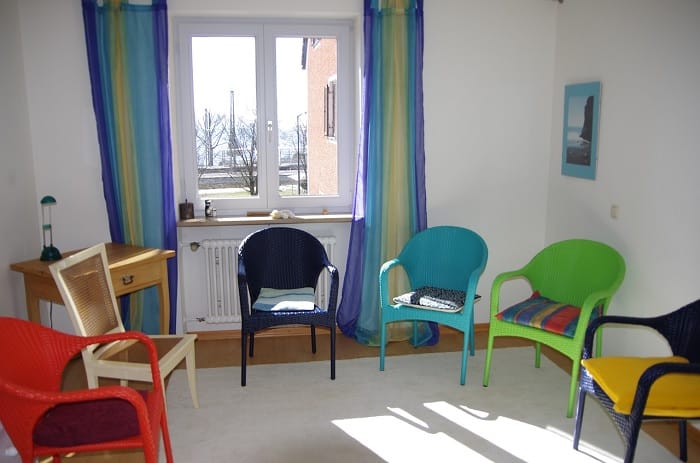Rehab in Hampshire helps many people every day to recover from addiction and stay sober.
Alcohol and substance abuse issues can start small, but with time, they can begin to consume your life.
Addiction problems can have a big impact on your health, your relationships, and your quality of life. But rehab can get your life back on track.
Whether you’re struggling with addiction yourself or worried about a loved one in Hampshire, rehab can help.
In a household, addiction impacts everyone, so it’s important to tackle the issue as soon as possible.
If anyone closely connected to you is struggling with alcohol or drug abuse, there are ways you can support them.
Rehab 4 Addiction offers referrals to modern recovery programmes and addiction treatment services.
These drug and alcohol rehab clinics operate across Hampshire to help you recover from alcohol and drug addiction/substance misuse.
Our recommended drug and alcohol rehab clinics have modern facilities and person-centered care.
Rehab programmes give you a quiet place in which to reflect and recover.
Every drug and alcohol rehab in Hampshire that we work with employs expert health workers. They look after patients 24/7, even during the night and at weekends.
This means patients receive lots of medical care during alcohol or drug detoxification and rehab.
Even if it’s not a substance use disorder you’re suffering from, but behavioural addictions, such as shopping addiction or problem gambling, we can help.
Every drug and alcohol rehab in Hampshire we work with offers personalised treatment plans for addictions, opioid use disorders and even binge drinking.
Personalised rehabilitation programmes are designed to fit patient needs, as we know one size doesn’t fit everyone.
We offer referrals to a number of UK addiction treatment programmes in Hampshire. These range from seven-day rapid-recovery programmes to six months of residential rehab.
You can choose how long you wish to stay at a drug and alcohol rehab in Hampshire. Most inpatients stay for between four and six weeks.
Alcohol and drug addiction services can transform your life, and help you begin a new chapter in recovery.
Rehab 4 Addiction in Hampshire
Address: RemediClinic, Marmion Avenue, Southsea, Hampshire, Hampshire. P05 2AXTelephone: 023 9280 0827
Business hours: Open 24 Hours/7 days a week
Services in Hampshire: Addiction Treatment, Alcohol Detoxification, Alcohol Rehabilitation, Drug Rehabilitation, Residential Rehab for Addiction, Alcohol Home Deto

Substance abuse including alcohol abuse can change the structure of the brain.
One of the areas rehab heals is the reward system – responsible for producing feel good hormones when we achieve something, do an enjoyable activity or experience a nice event.
When the reward system is changed, it can make it harder for you to experience happiness, satisfaction and pride for things that were once meaningful to you.
With recovery at rehab, you can rewire your brain and live a fulfilling life again without addiction.

Addiction is an extremely serious issue. The following statistics help to show just how much drug and alcohol addiction impacts life in Hampshire and why effective rehab services are so important.
Most people would immediately jump to the conclusion that drug and alcohol rehab in Hampshire is designed for people with the most severe of addictions.
However, there are many levels of substance use that can and should be treated through rehabilitation services in Hampshire. As with any illness, the sooner it is addressed, the less damage is done in the long term.
There are, though, situations where attending rehab is critical. Whether addictions are moderate or severe, where the following circumstances are present, rehab is essential:
Still unsure about whether drug and alcohol rehab in Hampshire is the right choice for you? Discuss it with our team on 0800 140 4690
Co-dependency in addiction is when a person helps enable the addiction by:
Rehab can help you understand how your relationships affect your behaviour.

There are many official diagnostic tests that can look at your signs and symptoms and assess if you have an addiction.
The NHS and private addiction rehabs can offer addiction diagnoses.
Getting a medical diagnosis can give you clarity, and help you make peace with the fact that you have an addiction, which can help you move forward into recovery.
A medical diagnosis at rehab will also assess the severity of your addiction.
Make an appointment with your GP if you think you may have an addiction.
There are three main types of psychiatric assessments that are used by professionals at rehab in Hampshire to assess your addiction.
It’s the goal of psychiatrists to understand the drives and motives around how you use and what your motivations are in relation to obtaining abstinence.
Psychiatric assessments will take place as soon as you enter a drug and alcohol rehab in Hampshire. They can take a few hours as they tend to ask questions which allow you to go into detail.
Remember, the more you share, the better diagnosis the professional can make and the more effective your stay at a drug and alcohol rehab in Hampshire will be.
This ensures you have better recovery outcomes in the long run once you leave rehab.
If hearing about these criteria have made you think about your own need for drug and alcohol rehab in Hampshire, call us today on 0800 140 4690.
We offer referrals to rehabs in beautiful locations across the UK.

Sadly, the number of drug deaths in the UK has risen since 2013. This includes people dying of alcohol-related liver disease.
This shows why rehab across the nation is so necessary.
One of the problems rehab can tackle is alcohol abuse problems.
There is a big demand for alcohol rehab across the UK, including in Hampshire.
If you live in Hampshire and need drug or alcohol rehab, then we are here to guide you towards the right rehab for your needs.
To learn more about the need for drug and alcohol rehab Hampshire, call us today on 0800 140 4690

At Rehab 4 Addiction, we have close links with inpatient drug and alcohol rehab in Hampshire. We know what specific areas each of these centres focus on.
This means we can match you with a centre that suits your goals.
In Hampshire, our rehab treatment centres offer programmes for various addictions.
These include alcohol, drugs, gambling, video games and many others.
We can offer referrals to top rehabs, and support you through to the admissions process at your chosen rehab.
During residential rehab in Hampshire, patients get time to reflect and rebuild. This will give them a firm base to stay sober over the coming years.
Even if you have relapsed, we can still help. The drug and alcohol rehab in Hampshire we work with offer a prescribed medical detoxification followed by a rehab programme.
This is a tried and tested method for getting clean.
Below, we list several drug and alcohol rehabs in Hampshire:

Upon arrival at a Hampshire rehab, patients will go through a test to check for mental health issues. They will also discuss their medical history with one of our staff.
After this, they will be prescribed medication to help with alcohol or drug withdrawal.
Patients begin therapy sessions soon after arrival at rehab. This includes one-to-one and group therapy.
These sessions are to treat the mental side of addiction.
Start your journey towards sobriety today at a drug and alcohol rehab in Hampshire by calling us on 0800 140 4690

One of the main features of the rehab experience at drug and alcohol rehab in Hampshire is structure and routine.
This is proven to aid your recovery journey, making patients feel secure and comfortable.
In an alcohol or drug rehab treatment, you will get up and go to bed at the same time every day. You will also have a set plan of things to do for the day.
These include group therapy, one-to-one sessions and holistic treatments. Finally, you will be given free time to do things you enjoy.
It’s important to note that you can leave our rehab centre in Hampshire at any time if you wish. However, we advise that you stay for the length of your treatment.
This gives you a good chance of getting clean and staying clean.
Some other points to remember about your day-to-day life in Hampshire rehab:
You’ll work on a relapse prevention plan which you can utilise even after your stay, to help you stay in long-term recovery.
To discover for yourself what the day-to-day experience of drug and alcohol rehab in Hampshire is like, call our team today on 0800 140 4690

There are many drug and alcohol rehab options in Hampshire. Your personal situation will determine which is right for you.

The NHS can offer community care from their substance misuse social work team.
It’s also possible to get an NHS referral to a private rehab, which would make your stay free.
NHS referrals often have a lengthy admissions process, so you may be waiting a long period of time.
You also have to fit a strict set of criteria to qualify for funding for a rehab referral.
There is also the option of taking part in an outpatient programme in Hampshire. This may be a good option for those who cannot take time off work.
In a Hampshire outpatient rehab programme, you come in for treatment for a few hours a day. You see a doctor help you through withdrawal symptoms.
Addiction treatment groups near Hampshire offer peer support and regular guidance to keep you on track with your recovery.
The organisations below are great self-help services that can be used in addition to rehab, or instead of.
Many are charity-funded and non-profit addiction/misuse services and fellowships run by organisations like the Southampton Voluntary Service which are available to anyone.
Address: Laurel House Farnham Road Hospital, Farnham Road, Guildford, GU2 7LX
Telephone: 0300 222 5932
Website: https://www.sabp.nhs.uk/our-services/drug-and-alcohol/i-access-surrey/iaccess-drug-alcohol
Address: 51 Bridge Street, Andover, Hampshire, SP10 1BG
Telephone: 0300 124 0103 25 and over / 0845 459 9405 24 and under
Website: https://www.inclusionhants.org/
Inclusion Recovery Centre Southampton
Address: 5-6, The Precinct, South St, Gosport PO12 1HA
Telephone: 0300 124 0103
Website: https://www.inclusionhants.org/timetables/gosport/
High quality free and NHS Foundation Trust-run drug and alcohol rehab services available across Hampshire include:

Address: Unit 3, The Sail Loft, Deacons Boatyard, Bridge Road, Southampton, SO31 8AZ
Telephone: 01256 799126
Website: https://www.turning-point.co.uk/
Address: 50, 52 London Rd, Southampton, SO15 2AH
Telephone: 023 8071 7171
Website: https://www.changegrowlive.org/drug-alcohol-service-southampton
Address: Bramblys Dr, Basingstoke, RG21 8UN
Telephone: 0300 304 0800
Website: https://hampshirecamhs.nhs.uk/
Address: Orion Centre/Dunsbury Way, Havant PO9 5BG
Telephone: 0300 124 0103
Website: https://www.hants.gov.uk/socialcareandhealth/publichealth/alcohol
Address: The Booth Centre, 57-58 Oxford Street, Southampton, SO14 3DL
Telephone: 02380 330797
Website: https://www.salvationarmy.org.uk/booth-centre-southampton
Address: No Limits Advice Centre, 13 High Street, Southampton, SO14 2DF
Telephone: 02380 224 224
Website: https://nolimitshelp.org.uk/
Address: 37 Salisbury Rd, Totton, Southampton SO40 3HX
Telephone: 0800 515 819
Website: https://iyc.org.uk/
Address: 2 The Carronades, New Road, Southampton SO14 0AA
Telephone: 023 8071 7171
You can also attend support groups within Hampshire. You may also have one-to-one therapy to deal with the mental aspect of your addiction.
Address: Havelock Community Centre, 324 Fawcett Road, Southsea, Hants, PO4 0LQ
Telephone: 023 92 295821
Website: https://havelockcc.co.uk/
If you are in addiction and you’re not ready to become abstinent, there are some harm reduction services you can use.
Hampshire needle and syringe programmes can stop the spread of illnesses and keep you and other people safer.
Unlike rehab, the aim is not to stop the addiction, but to prevent further harm.

Address: Friends Meeting House, 16 Colebrook St, Winchester
Telephone: 023 8022 3198
Website: https://www.alcoholics-anonymous.org.uk/intergroups/northdown-intergroup/
Basingstoke Lunchtime Daily Reflections
Monday 12:00–13:00
Address: Church Cottage St Michael’s Church, Church Sq, Basingstoke, RG21 7QL
Andover Young Recovery
Mondays 18:30–19:30
Address: King Edward VII Memorial Hall, Village St, Upper Clatford, Andover, SP11 7QL
Whitchurch Let Go and Let God
Mondays 19:00–20:00
Address: Whitchurch Methodist Church, 11 Winchester St, Whitchurch, RG28 7AL
Chichester Step & Tradition
Mondays 11:15–12:45
Address: St Pancras Church, Eastgate Sq, Chichester, PO19 1JL
Portsmouth Lunchtime
Mondays 12:00–13:00
Address: Buckland United Reformed Church, (Junction Kingston Rd/, Queens Rd), 174 Kingston Rd, Buckland, Portsmouth, PO2 7LP
Big Book & Steps Open Meeting Online
Mondays 18:30–19:30
You can find more AA meetings here.

Address: Pavilion on the Park, 1 Kingfisher Road, Eastleigh, Hampshire
SO50 9LH
Telephone: 0300 999 1212
Step Working Meeting – Wednesday 20:00-21:15
Address: Main Room, Friends Meeting House Quakers, 16 Colebrook Street, Winchester, Hampshire
SO23 9LH
Telephone:
Living Clean Meeting
Address: Main Room, Friends Meeting House Quakers, 16 Colebrook Street, Winchester, Hampshire
SO23 9LH
Telephone:
Sex Addicts Anonymous Winchester
Address: Friends Meeting House 16 Colebrook St, Winchester SO23 9LH
Website: https://saauk.info/meetings/details/winchester-saa/
Sex Addicts Anonymous Portsmouth
Address: Sacred Heart of Jesus and St. Peter the Apostle Waterlooville, London Road, Waterlooville
Website: https://saauk.info/meetings/details/portsmouth-tuesday-night-meeting/

Address: The Booth Centre, 57-58 Oxford Street, Southampton, SO14 3DL
Telephone: 02380 330797
Website: https://www.salvationarmy.org.uk/booth-centre-southampton
AA and NA meetings in/near Hampshire are twelve step meetings that look to a higher purpose for help in recovery.
These can also be used alongside rehab.
Twelve step programmes are recovery meetings that look to a higher power for support achieving sobriety.
Your addiction rehabilitation group will arm you with the tools you need to stay clean in the future.
Fellow attendees at the twelve-step recovery model will support you by listening to your experiences, and you’ll support them in their journey.
This offers you peer mentoring, which can be beneficial to a long-term recovery.
Make sure you end up at the best possible drug and alcohol rehab in Hampshire for you by calling our team on 0800 140 4690

Inpatient rehabs are private rehabilitation, although it is possible to get a referral from the NHS.
These are residential rehab treatment centres that offer privacy, anonymity and a 24/7 service.
This gives you an excellent standard of care, and the best chances of recovery.
Usually inpatient rehab lasts four weeks, but this can change based on your circumstances.
Private rehab options offer a comprehensive package from your first consultation to your new life in recovery.
Inpatient rehab centres can give you the best chance of a successful recovery.
To learn more about what private rehab provides, call us on 0800 140 4690

Taking part in a private drug rehab programme is one way to ensure your recovery. This consists of alcohol and drug detox, counselling, therapy and workshops.
When you choose an inpatient programme in Hampshire setting, there are no external factors to distract you from your rehab. You don’t have to worry about work, or family.
Inpatient rehab is a safe sanctuary that’s free from drugs and alcohol, so you don’t have to face temptation in those vital early days.
This can help you stay away from relapse risks.
Inpatient rehab gives you a break from anything else you may be dealing with in society – all you need to focus on is your recovery.
Every aspect of your life, from a regular routine to meals filled with nutrition, is carefully selected to give you the best chances of recovery.
On top of this, you will have 24-hour medical care from the staff at rehab. You will have emotional support too because we know this can be a hard time.

Private rehab gives you the best opportunity to recover long-term.
As these services are better funded, you’ll receive specialist addiction support.
These rehab facilities have better resources, and more choice.
With our team to look after you, you can feel sure that everything will be taken care of.
Many find that they make friends in rehab. It can be good being around people who are going through the same thing as you.
In rehab, everyone supports each other.
With an inpatient programme at a drug and alcohol rehab in Hampshire, you have access to 24-hour medical care. This can be invaluable when you are going through withdrawal.
What’s more, they give you a sense of routine. During a residential Hampshire rehab programme like this, your whole day will be planned out for you.
Addiction specialists, doctors, consultant psychiatrists and other healthcare professionals use cutting edge, proven treatment techniques that have been researched and found to have the best chances of boosting recovery rates after rehab.
Private rehab can be costly.
If you don’t have health insurance and don’t meet the criteria for an NHS referral, you may have to pay for your treatment fees yourself.
For a clear idea of what drug and alcohol rehab in Hampshire and across the county can do to help you, call us on 0800 140 4690

Yes, many top insurance providers offer alcohol and drug rehab treatment.
This includes:
However, you should check your health insurance policy, as different packages have varying levels of cover for addiction rehab.

What works for one person may not work for another.
Drug and alcohol rehab in Hampshire offers a variety of therapy options.
Addiction counselling treatments are evidence-based addiction support that are often used at rehab.
An experienced counsellor will provide you with feedback and education about the disease of addiction and the recovery process.
Therapy and pastoral care is a vital part of the treatment process for addiction.
There are a wide range of therapies and group therapies on offer at rehab:
Other therapies include:
Counsellors at rehab are fully trained in psychiatry, clinical psychology and addiction services, and can tailor your service to your recovery.
These will help you gain psychological resilience, so you feel mentally strong enough to beat addiction.

Alternative therapies at rehab include holistic therapies that support general wellbeing through mindfulness and movement.
These not only allow you to express yourself in different ways, but you’ll have the opportunity to pick up a new hobby.
Doing things you’re good at can boost your self esteem, and help you stay on the right track after rehab.
Alternative therapies can help you tap into your spiritual side.
Expressive therapies utilise the arts to allow you to express yourself and improve your wellbeing during rehabilitation:
Physical activity releases mood-boosting hormones to help you feel more positive throughout your rehab treatment.
This can help you fight cravings by allowing you to feel happy without the need for substance abuse or addictive behaviours.

Addiction treatments like therapy can improve your rehabilitation chances by getting to the root causes of your addiction.
Therapy also makes the rehab process easier, by easing your mental symptoms and giving you a positive mindset.
Coping techniques like stress management can prevent relapse by giving you other outlets to manage your emotions and relapse triggers.
To benefit from any of these excellent treatments at drug and alcohol rehab in Hampshire, call our team today on 0800 140 4690
Treating your physical health in addiction rehabilitation is also important in addiction recovery.
Good physical health is proven to improve rates of recovery success.[1]
This includes:
Name: Hampshire Mind
Website: https://www.solentmind.org.uk/
Telephone: 023 8202 7810

Withdrawal can be really tough. The symptoms vary depending on the severity of your addiction or substance abuse, but they tend to be unpleasant.
Alcohol and heroin withdrawal are two addictions that often require medication to recover from. Rehab can prescribe this.
Withdrawal symptoms happen when the body stops having access to a substance. Your body gets used to having it, and when it stops getting it, it goes into withdrawal.
When you first get to rehab, withdrawal may cause cravings and physical side effects. These begin around 2 days after last taking the substance.
They can continue for around a week.
The emotional impact of withdrawal can last much longer. Therapy is a great way to deal with this.
Some of the most common withdrawal symptoms experienced by those going through detox at rehab are as follows:
Addiction medicine can help with these symptoms.

Addiction is an illness that affects the entire family and social groups. It’s one that shifts the dynamics of relationships and which can cause huge damage.
If you want to refer your loved one to rehab, intervention can help.
Loving someone with an addiction can feel incredibly hard, even impossible at times.
Interventions are usually where one or two members of the family come together with a professional to raise concerns around a person’s substance use and suggest treatment options like rehab.
To discuss holding an intervention, call our expert team today on: 0800 140 4690

The substance that is taken, the level of addiction, and varying circumstances in the individual’s life -amongst other factors- will determine how long a person stays at rehab.
A person might enter for a detox, for instance. The shortest length of time for this to take place is usually around seven days.
The goal is to support the person through withdrawal in a safe way so that they leave the clinic sober after rehab.
Detox alone isn’t actually the best way to keep a person sober for the long term. It’s brilliant in order to give the body a break, but in order to stop the person from returning to the substance, therapies are needed.
In order for therapies to be effective, they need to take place over a few weeks.
The most effective length of time for people to stay at rehab under therapeutic care is around twenty-eight days. This can, however, be a little longer, especially in the case where mental health problems also exist.
Call our expert team today on: 0800 140 4690

Rehab can help with addiction to:

People who have addictions develop them because of particular factors that have been present beforehand.
For instance, it’s common for people who have grown up around a parent with an addiction to then develop an addiction themselves and wind up needing rehab.
Another factor that can cause a person to turn to drugs and alcohol is the existence of mental health conditions. These can be treated at rehab.
These include a wide range of emotional and behavioural disorders.
Rehab can incorporate your personal needs into your recovery programme.
The Centre for Addiction and Mental Health found that 1 in 5 Canadians will experience a mental illness.[2]
In the UK, mental illness is even more prevalent – at 1 in 4.[3] Mental health disorders are very common at rehab.
Many people use substances to ease feelings of the following mental health conditions:
New ways of treating these mental conditions at rehab are always being discovered.
Dual diagnosis requires substantial remedies that treat your mental health disorder and your addiction.
They can be treated at rehab with:
Trauma therapy is a specific type of therapy that tackles PTSD and psychological trauma.
Dual diagnosis care is treated seriously at rehab to give you the best possible recovery outcome.
For a recovery plan that suits all of your addiction needs, call our expert team today on: 0800 140 4690

If a person is living with a mental health problem as well as an addiction, it’s imperative that they be treated for both when entering rehab.
When professionals understand that the two conditions exist, they’re able to offer a tailored programme that addresses your mental health too.
A dual diagnosis can be gained during the admission assessments at rehab.
For this to happen, you must be honest about how you feel about life, your thoughts and reactions, and how you feel your mental health is.
When residents at rehab are treated for both, they stand a better chance of a successful and long-term recovery.
You can also find general mental health support at Rethink Mental Illness, Papyrus, Young Minds, Samaritans and Mind UK.
To discuss rehab further, call our expert team today on: 0800 140 4690

As mentioned earlier, rehab is essential for some people to properly recover. This is especially the case in instances where the person or people around the addicted person are at risk of harm.
Drug and alcohol rehab in Hampshire is the most effective option for treating those who have moderate to severe addictions.
There are, however, other options to attending rehab in the Hampshire area.
These include:

Alcohol is a powerful toxin with the power to deteriorate your memory, cognition and organ function, like the heart and liver.
Alcohol detox is where a person enters rehab to withdraw safely from alcohol consumption.
Your detox at rehab will depend how many alcoholic beverages you’re drinking per day.
When a person has alcoholism (alcohol use disorder or dependence) and is drinking every day, alcohol creates a physical dependency where the structure of your brain changes.
Where this is most severe it can be extremely dangerous when a person tries to stop drinking. Therefore, a clinical rehab team is essential in order to supervise the detox.
Medical professionals can conduct a physical examination to assess you for the physical symptoms of alcohol withdrawal.
At rehab, medications such as Librium (a benzodiazepine, Chlordiazepoxide) can be prescribed.
Librium supports a person to withdraw safely at rehab by managing the side effects of alcohol depletion.
Your medication will be prescribed safely, to reduce your chances of benzodiazepine dependence.
At a minimum, it takes seven days to withdraw from alcohol safely under a medically supervised detox at rehab, although it often takes a few days longer.
Yes, alcohol detox can be very dangerous for a person who is severely dependent on alcohol.
Generally speaking, you sweat and shake. Some people will experience hallucinations. These symptoms can be treated at rehab.
At its worst, alcohol withdrawal syndrome causes seizures due to its direct impact on brain functioning.
In extreme cases, this can be fatal.
For all these reasons, it’s important that you seek professional help in order to quit alcohol. Rehab can ensure you stay safe and healthy.
There are some instances where a medically supervised detox can happen while you remain living at home during addiction recovery. This is not the same as “going it alone”.
Instead of going to rehab, you’ll detox at home.
This is a detox where you’ll be in daily contact with a doctor who will prescribe medication and assess how you are each day.
This type of detox is cheaper (usually around £1,500), but because you don’t have 24-hour care it isn’t as safe as a detox at a rehab clinic.
They are also only available to patients who doctors identified as being low risk in terms of being able to manage this approach effectively and safely.
Drinking alcohol regularly can result in vitamin B1 (thiamine) deficiency.
You should take supplements even after you quit, as it can take some time to get your levels back to normal.
The alcohol rehabilitation experience at rehab will provide you with everything you need to boost your health after addiction.
As alcohol is a widely used substance across the UK, you will likely have to deal with alcohol triggers once you leave rehab.
Coping mechanisms to deal with these triggers will be vital to staying in recovery long-term.

Withdrawing from substance dependence or alcohol dependence can be tough physically and mentally.
That’s why rehabs use evidence-based medicine to reduce your withdrawal symptoms and make you feel more comfortable.
Staying in drug rehab in Hampshire could give you a good chance of recovery. First, you will have around-the-clock access to medical care.
This helps ensure that your health remains at its best whilst going through recovery.
At rehab, you will be able to recover in a comfortable environment. There will be nothing to distract you, and no temptation to relapse.
You will also be taught effective coping mechanisms, relapse prevention techniques and may even be introduced to sober living houses after you leave rehab.
Managing withdrawal can be very difficult. But don’t let that stop you from getting clean.
A Hampshire detox and rehab will provide the physical and emotional support you need.
Call our expert team today on: 0800 140 4690
Complimentary and holistic treatments are often used alongside scientific approaches during recovery, but it’s important not to rely solely on alternative medicine at rehab.
Speak to your GP or rehab about using alternative medicine.
Detoxification support is also available through outpatient and NHS addiction treatment services.

The price of drug and alcohol rehab varies depending upon the centres you select, the amount of time you stay at the rehab and whether you opt to sleep in a single or multiple occupancy room.
Fortunately, there are a range of rehab options.
If you opt for a 10-day detox with a single occupancy room, then prices cost between £3,000-£6,000.
Prices for a multi-occupancy room vary from £2,000-£4,000.
If you wish to stay at rehab for 28-days, then expect to pay around £8,000-£12,000 for a single occupancy room, or around £6,000 for a multi-occupancy room.
If you wish to undergo a home detox, then you may save money, but you will not be shielded from temptations. However, home detoxes do work for many people.
Expect to pay around £1,500 for a home detox. We may inform you of the exact prices of rehabs in your local area.
For help finding addiction clinics, call our expert team free today on: 0800 140 4690

Once your Hampshire rehab programme comes to an end, you gain access to aftercare. Aftercare helps prevent relapses.
Patients should also consider attending Alcoholics Anonymous (AA meetings), Narcotics Anonymous (NA) or Cocaine Anonymous (CA) meetings.
These groups help to keep them on the right track and provide the peer support that can often be the difference between a successful rehab recovery and relapse.
SMART Recovery can also be an excellent source of support and provides its own, more secular approach to maintaining sobriety
If you need more help or advice after rehab, we’re only a phone call away.
With drug and alcohol addiction being such a complex illness, it is important that a rehab centre in Hampshire offers a variety of psychiatric treatment options to suit every need.
Most commonly these are inpatient, outpatient, residential, or short-stay options.
There is a clear difference between these rehab programmes, with inpatient options being overseen by a licensed hospital whereas a residential programme is much less medically strict.
For more info about recovery centres, call us now on 0800 140 4690 for a confidential and free consultation about drug and alcohol rehab clinics.

When staying in a drug and alcohol rehab addiction centre you will have the advantage of access to medical staff.
These facilities are equipped with nurses, doctors and addiction counsellors who are highly trained and certified.
Senior rehab staff will have taken additional training in the area of addiction and the medical care relating to it.
Many rehabs do offer sober transport services.
These are dedicated taxis or mini busses that can get you from your home to your rehab facility and any other visits or appointments you may need to attend.
For addiction treatment recommendations, call us now on 0800 140 4690 for a confidential and free consultation about drug and alcohol rehab clinics.
Good rehab clinics will offer a complimentary aftercare plan with regular check-ins.
This will keep you on the right track, and remind you of your coping mechanisms.

Want to break free from substance misuse and learn more about your path to a happier and sober future?
Find treatment for alcohol and drug addiction today with support from high quality rehab programmes and services based in and around Hampshire.
Rehab provides evidence-based interventions underpinned by excellent care and good recovery rates.
Recovery at rehab can improve your health, your family life, your employment, your relationships, and help you to regain confidence, boost your energy levels and sleep better.
All of the addiction centres we recommend are CQC registered, which means they’re regulated by the Care Quality Commission (England and Wales) or the Care Inspectorate (Scotland).
We offer access to addiction psychiatric treatment services for people all across North Hampshire, South Hampshire, East Hampshire, West Hampshire, whether you’re looking for beautiful landscapes or a city stay.
From the Gunwharf Quays to the Hampshire countryside, we can find you a rehab that suits you within easy reach by car or public transport links such as the South Western Railway and Southampton Airport.
Locations include Southampton, Basingstoke, Eastleigh, Havant, Winchester, Fareham, Gosport, Farnborough, Waterlooville, Fleet, Aldershot, Totton and Eling, New Milton, Lymington and Pennington, Hedge End, Yately, Romsey, Alton, Petersfield, Portsmouth, Bishops Waltham, Blackwater, Halstead, Camberley, Fordingbridge, Worplesdon, Worthingand many more places across the hampshire borders and south east England.
Take the step towards a happy life in recovery today.
We offer addiction treatment recommendations to top rehabs across the UK.
We can guarantee anonymity throughout the call.
For more info about alcohol and drug rehab clinics, call us now on 0800 140 4690 for a confidential and free consultation about drug and alcohol rehab clinics.
This article was written by Boris Mackey. You can connect with Boris online at LinkedIn or X.com.
[1] https://www.ncbi.nlm.nih.gov/pmc/articles/PMC3354725/
[2] https://www.camh.ca/en/driving-change/the-crisis-is-real/mental-health-statistics